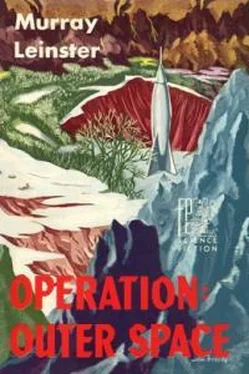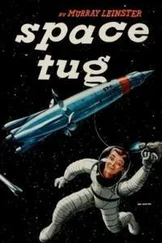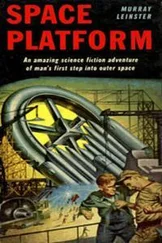He could not walk, and the distance was too great to carry him. Holden reported by walkie–talkie, and Jones proposed to butcher one of the animals Johnny had killed and put it in a freezer emptied for the purpose, and then lift the ship and land by the sea. It seemed a reasonable proposal. Johnny was surely not seriously wounded.
But that meant time to wait. Alicia sat by her husband, soothing him. Holden moved along the beach, examining the shells that had come ashore. He picked up one shell more glorious in its coloring than any of the pearl–making creatures of Earth. This shell grew neither in the flat spiral nor the cone–shaped form of Earth mollusks. It grew in a doubly–curved spiral, so that the result was an extraordinary, lustrous, complex sphere. Bell fairly danced with excitement as he photographed it with lavish pains to get all the colors just right.
Cochrane and Babs moved along the beach also. It was not possible to be apprehensive. Cochrane talked largely. Presently he was saying with infinite satisfaction:
"The chemical compounds here are bound to be the same! It's a new world, bigger than the glacier planet. Those beasts last night—if they're good food–stuff—will make this a place like the old west, and everybody envies the pioneers! This is a new Earth! Everything's so nearly the same—."
"I never," observed Babs, "heard of blue sand on Earth."
He frowned at her. He stooped and picked up a handful of the beach stuff. It was not blue. The tiny, sea–broken pebbles were ordinary quartz and granite rock. They would have to be. Yet there was a blueness—The blue grains were very much smaller than the white and tan and gray ones. Cochrane looked closely. Then he blew. All the sand blew out of his hand except—at last—one tiny grain. It was white. It glittered greasily. Cochrane moved four paces and wetted his hand in the sea. He tried to wet the sand–grain. It would not wet.
He began to laugh.
"I did a show once," he told Babs, "about the old diamond–mines. Ever hear of them? They used to find diamonds in blue clay which was as hard as rock. Here, blue clay goes out from the land to under the waves. This is a tiny diamond, washed out by the sea! This is the last thing we need!" Then he looked at his watch. "We're due on the air in two hours and a half! Now we've got what we want! Let's go have Holden tell Jones to hurry!"
But Babs complained suddenly,
"Jed! What sort of life am I going to lead with you? Here we are, and—nobody can see us—and you don't even notice!"
Cochrane was penitent. In fact, they had to hurry back down the beach to join the others when the space–ship appeared as a silvery gleam, high in the air, and then came swooping down with fierce flames underneath it to settle a quarter–mile inland.
Bell had a picture of the tiny diamond by the time the ground was cool enough for them to re–enter the ship. The way he photographed it, against a background which had nothing by which its size could be estimated, the little white stone looked like a Kohinoor. It was two transparent pyramids set base to base, and he even got color–flashes from it. And Jamison, forewarned, took pictures from the air of the blue–sand areas. They showed the tint the one tiny diamond explained.
The broadcast was highly successful. It began with a four–minute commercial in which the evils of faulty elimination were discussed with infinite delicacy, and it was clearly proved—to an audience waiting to look beyond the stars—that only Greshham's Intestinal Emollient allowed the body to make full use of vitamins, proteins, and the very newest enzymatic foundation–substances which everybody needed for really perfect health. There followed the approach shots to this planet, shots of the great beast–herds on the plains, views of luxuriant, waving foliage, the tide of shaggy animals as they came at dusk to their drinking–place, and there was an all–too–brief picturing of the blue–tinted soil which the last film–clip of all declared to be diamondiferous.
Cochrane's direction of this show was almost inspired. The views of the animal herd were calculated to make any member of his audience think in simultaneous terms of glamour and adventure—with perfect personal safety, of course!—and of steaks, chops and roasts. The more gifted viewers back on Earth might even envision filets mignon. The infinitesimal diamond with its prismatic glitterings, of course, roused cupidity of another sort.
There were four commercials cut into these alluring views, the last was superimposed upon a view Bell had taken of the sunset–colors. And it might have seemed that the television audience would confuse the charm of the new world as pictured with the product insistently praised. But the public was pretty well toughened up against commercials nowadays. It was not deceived. As usual, it only deceived itself.
But there was no deception about the fact that there was a new and unoccupied planet fit for human habitation. That was true. And the fretting overcrowded cities immediately became places where everybody made happy plans for his neighbor to move there. But the more irritable people would begin to think vaguely that it might be worth going to, for themselves.
The ship took off two hours after the broadcast. Part of that time was taken up with astrogational conferences with astronomers on Earth. Cochrane had this conference taped for the auxiliary broadcast–program in which the audience shared the problems as well as the triumphs of the star–voyagers. Cochrane wanted to get back to Earth. So far as television was concerned, it would be unwise. The ship and its crew would travel indefinitely without a lack of sponsors. But for once, Cochrane agreed entirely with Holden.
"We're heading back," he told Babs, "because if we keep on, people will accept our shows as just another superior kind of escape–entertainment. They'll have the dream quality of 'You Win a Million' and the lottery–shows. They'll be things to dream about but never to think of doing anything about. We're going to make the series disappointingly short, in order to make it more convincingly factual. We won't spin it out for its entertainment–value until it practically loses everything else."
"No," said Babs. She put her hand in his. She'd found it necessary to remind him, now and then.
So the ship started home. And it would not return direct to Earth—or Lunar City—for a very definite reason. Cochrane meant to have all his business affairs neatly wrapped up before landing. They could get another show or two across, and some highly involved contracts could be haggled to completion more smoothly if one of the parties—Spaceways, Inc.—was not available except when it felt like being available. The other parties would be more anxious.
So the astrogation–conference did not deal with a direct return to Earth, but with a small sol–type star not too far out of the direct line. The Pole Star could have been visited, but it was a double star. Cochrane had no abstract scientific curiosity. His approach was strictly that of a man of business. He did the business.
There was, of course, a suitable pause not too far from the second planet—the planet of the shaggy beasts. They put out a plastic balloon with a Dabney field generator inside it. It would float in emptiness indefinitely. The field would hold for not less than twenty years. It would serve as a beacon, a highway, a railroad track through space for other ships planning to visit the third world now available to men. Ultimately, better arrangements could be made.
Jones was already ecstatically designing ground–level Dabney field installations. There would be Dabney fields extending from star to star. Along them, as along pneumatic tubes, ships would travel at unthinkable speeds toward absolutely certain destinations. True, at times they could not be used because of the bulk of planets between starting–points and landing–stations. But with due attention to scheduling, it would be a simple matter indeed to arrange for something close to commuters' service between star–clusters. He explained all this to Cochrane, with Holden listening in.
Читать дальше






